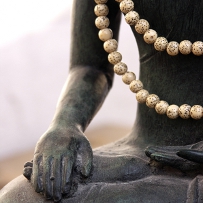|
|
|
|
|
 |

|

|

|
The greatest gift is the
gift of the teachings
|
|

|
| |
|
Four Brahma Viharas
|
2009-05-19
Four Brahma Viharas
2:18:08
|
|
Shaila Catherine
|
|
|
A collection of four talks on the immeasurable and boundless qualities of heart known as the Brahma Viharas: loving kindness/friendliness, compassion, joy, equanimity.
|
|
Insight Meditation South Bay - Silicon Valley
:
Four Brahma Viharas
|
|
Loving Kindness
30:02
|
|
|
Loving Kindness, friendliness (metta) is a clear intention and attitude of heart that supports a connected and joyful encounter with life. Metta is not sentimentality; it is not affection or attachment. It is a strong quality of heart that overcomes ill will, hatred, fear, and anger. Loving kindness practice is a way to take responsibility for our own happiness; it is a way to cultivate an attitude to life that supports deep friendship.
|
|
Compassion
22:19
|
|
|
Compassion, karuna, is the intention of non-cruelty. It is the aspect of loving kindness (metta) that responds wisely to pain, and wishes to alleviate suffering. Compassion training helps us to remain present with pain. There is no need to fear pain, no need to consider pain bad or wrong. A compassionate self-acceptance allows us to remain present and responsive in the face of life's most difficult moments. With compassion we can ask "How can I help?" and stay present to respond.
|
|
Appreciative Joy
44:02
|
|
|
Appreciative joy (sympathetic joy, mudita) is the third of four qualities called Brahma Viharas (divine abodes) which are the subjects for this 4-part lecture series. Appreciative joy is presented as an extension of the loving kindness (metta) practice. Joy refers to the ability to delight and rejoice in the success and good fortune of others. Mudita overcomes the hindrances and obstacles of conceit, comparing, envy, avarice, jealousy, aversive criticism, resentment, competitiveness, and boredom.
|
|
Equanimity
41:43
|
|
|
This talk explores equanimity as the fourth of the four qualities called Brahma Viharas. Previous talks in this series addressed loving kindness, compassion, and appreciative joy. Equanimity allows us to remain present and awake with the fact of things—equally close to the things we like and the things we dislike. It is important to develop equanimity in two arenas: 1) in response to pleasant and painful feelings, and 2) regarding the future results of our actions. Equanimity develops in meditation and in life. We can use unexpected events that we cannot control to develop this quality. Our job is not to judge our experiences, but to be present and respond wisely. Equanimity is a beautiful mental factor that can feel like freedom, but if "I" and "mine" still operate, there is still work to be done. Many suggestions are offered for cultivating equanimity.
|
|
|
|
|
|
|
|
|
|